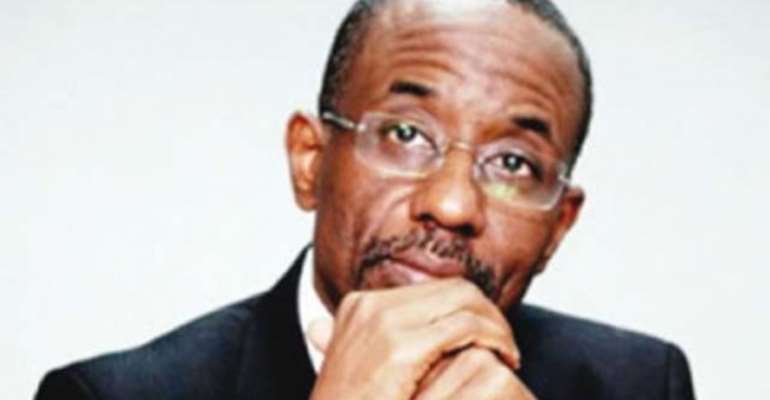CBN and war on money laundering – Punch

The alarm by the Central Bank of Nigeria that Nigeria is awash with foreign currencies highlights lax regulation and the failure to strictly enforce relevant laws. The revelation by the bank that Nigeria 'has become the largest importer of United States dollars' confirms the rising dollarisation of the economy where politicians, other public officials and the nouveau riche advertise their status by spending the green back and disdaining the naira. Only rigorous monitoring and law enforcement can protect our fragile economy from severe damage by unbridled money laundering.
CBN expressed concern about the large amount of US dollars and other foreign currencies demanded by banks and bureaux de change and never accounted for and reached a conclusion that astute observers already knew. Beyond the regular, unbridled plunder of the public treasury, the surge in the demand for forex is linked to partisan politics. Public funds are being diverted into the market. The bank's authoritative voice gives the lie to President Goodluck Jonathan's assertion during a presidential media chat beamed live on radio and television to a bemused populace, that his government was winning the war on corruption. Until the president acknowledges the reality that, under his watch, corruption has run riot, he cannot even begin to tackle the problem. Money laundering, especially by politically exposed persons, is thriving despite several laws and strict financial guidelines.
The concern that money laundering is weakening the naira and could further push up inflation (put at 10.5 per cent) is only half of the story. A study by the International Monetary Fund found that economic and financial crimes, including money laundering, represent a very dangerous form of criminal behaviour that impacts negatively on the economic health and material welfare of a country. Experts add that they are 'non-violent practices that are tantamount to economic sabotage'. Interpol explains that money laundering erodes the quality of life in developing countries, cripples the economy and inhibits the development of strong political institutions. In Nigeria, politicians, businessmen and public servants launder money through banks, BDCs, casinos, stockbroking houses, automobile dealerships and inflated contracts. Some simply cart away millions of dollars. This way, according to the pioneer Chairman of the Economic and Financial Crimes Commission, Nuhu Ribadu, about $500 billion was stolen in Nigeria between 1960 and 2000 while between the mid-1980s and 1999, about $100 billion was illegally exported from here.
As the regulator, CBN must do more to protect the integrity of the financial system. Its efforts to tame inflation, keep interest rates low and firm up the naira have not yielded optimum results partly because of the reckless spending of the federal and state governments, money laundering and weak enforcement. While it can hardly rein in the fiscal irresponsibility of the government, it should tighten the noose on the deposit money banks and the BDCs. Its drastic move in July, imposing a Cash Reserve Ratio (percentage of deposits that must be kept in the vaults) of 50 per cent of public funds deposits should be strictly enforced. Banks have routinely flouted such regulations in the knowledge that, often, they will only be fined, while they get to keep the profits of their crime. The CBN should henceforth invoke the relevant anti-money laundering laws and prosecute errant bankers in the courts.
The introduction of the Retail Dutch Auction System to replace the Wholesale Dutch Auction System at the official foreign exchange market is also welcome. The RDAS will tie every forex sale to a specific customer's demand instead of the wholesale release to banks' demand under WDAS, thereby ensuring proper documentation and tracking. The CBN had been lax in the past by not insisting on strict accounting for all forex sold and penalising those who could not meet the cut. It is time the bank also closely monitored the BDCs, 20 of whose licences the bank rightly withdrew last week for failing to provide documentation for the forex they had purchased. The CBN and the EFCC should end the unholy alliance that facilitates the deposit money banks using BDCs as conduits to help public officials and others to launder money.
In this crusade, the CBN will, however, be trying to catch the wind unless the EFCC and the Independent Corrupt Practices and Other Related Offences Commission wake up from their slumber and end the ongoing large-scale looting of the treasury at source. The government should ensure strict compliance with financial regulations and prosecute corrupt officials.
The regulator should not permit any infraction of its regulations by financial institutions any longer. It should tighten the noose and make financial institutions too risky for money laundering. A situation where a bank will honour numerous cheques of N999.99 million each issued daily for several days by corrupt officials without even reporting to the authorities, as revealed in the pension office scandal, should never be allowed to happen again. The CBN and the EFCC should make the punishment severe as to outweigh whatever gains might go to any bank from such fraud. The CBN itself should enhance its ability to instantly monitor transactions and detect fraud and illegal movement of funds.
